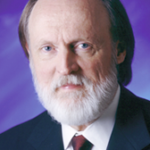
Note: It has been 18 months since Dr. Dwight Pryor’s passing. Today, there is no special calendar date as to why I am specifically posting this article from March of 2011, which appeared in the Jerusalem Post Christian Edition. In preparation for a talk on Prayer in coming weeks, I came across an article today on the internet by Dwight, suggesting Christians to study the Siddur (Jewish Prayer Book) as well as recommending the Authorized Daily Prayer Book by J.H. Hertz. He states that by studying Israel’s corpus of devotional life it “will yield fruitful insights and important principles that can expand our understanding and enliven our practice of prayer.”
While I am quite familiar with the Hertz Siddur and have used it on several occasions, the reminder from Dwight was quite helpful. The Talmud states: the righteous, even in death are called living.
In the revamping of CJCUC’s website in the last nine months, I always said to myself that I would one day put a tribute to Dwight. Today is that day. Thank you Dwight!
By: DAVID NEKRUTMAN
On February 5, 2011, the world lost a true biblical giant and one of the premiere leaders in Jewish-Christian relations, Dr. Dwight A. Pryor. I owe much to Dwight, for he has helped me in my sacred calling in Jewish-Christian relations for the last 10 years. His writings, sermons and messages have given me a deeper understanding of a growing movement within Christianity – those wishing to learn more about the Hebraic foundations of the Bible.
During his last year on earth I had the distinct honor to develop a personal fellowship with him when he joined The Center for Jewish-Christian Understanding & Cooperation’s Jewish-Evangelical Christian Colloquium. I will sorely miss him.
In Judaism, when someone passes away, the rabbinic custom is to say a prayer known as the kaddish. However, if one examines the prayer in its entirety, one finds no mention of death or mourning. Here is the translated text of the kaddish:
Glorified and sanctified be God’s great Name throughout the world which He has created according to His will. May He establish His kingdom in your lifetime and during your days, and within the life of the entire House of Israel, speedily and soon; and say, Amen.
May His great Name be blessed forever and to all eternity.
Blessed and praised, glorified and exalted, extolled and honored, adored and lauded be the Name of the Holy One, blessed be He, beyond all the blessings and hymns, praises and consolations that are ever spoken in the world; and say, Amen.
May there be abundant peace from heaven, and life, for us and for all Israel; and say, Amen.
He who creates peace in His celestial heights, may He create peace for us and for all Israel; and say, Amen.
The kaddish is the doxology of our hope that God’s great Name will be sanctified in the whole world. The central phrase is “May His great Name be praised forever and ever and ever.” The biblical verses that come closest to this Aramaic line are Deuteronomy 32:3, Psalms 113:2 & Daniel 2:20.
The kaddish affirms that life begins and ends with God, and all of it is a gift, as the Book of Job says (1:21), The Lord gave, and the Lord hath taken away; blessed be the Name of the Lord.
There are certain deaths that are hard to reconcile with, such as the sudden death of a loved one or the passing of a child. Reciting the kaddish allows us the time to make some kind of peace with the judgment of God even if we don’t fully understand it.
Although in the past the kaddish was recited only after the study of God’s Word, it has subsequently been integrated into daily Jewish prayer and life. This represents a yearning of the world accepting God and our messianic hope that His kingdom and peace will eventually reign.
The Talmud records Elijah the prophet telling Rabbi Yose that when the Jewish people enter synagogues and study-halls and proclaim, “May His great Name,” God nods His head and says, “How fortunate is the King Whom they praise in His house like that! Woe to the Father Who exiled His children, and woe to the children who have been exiled from their Father’s table!”
Notice that when God mentions exile He is known as Father and not King. It is only when the Jewish commonwealth is established again in its entirety that God will once again be known as King.
Dwight understood that 1948 marked a significant moment in sacred history, and that a Christian could no longer hold the view of Replacement Theology. He believed that God’s covenantal promises are eternal, and for one to truly understand the Bible a Hebraic foundation is essential.
I declare “May His great Name be blessed forever and to all eternity” for having created a Dwight in my lifetime and paving the way for Jews and Christians to talk to one another instead of at each other.
May we all say a kaddish for Dwight!
Hello world!
Welcome to WordPress. This is your first post. Edit or delete it, then start writing!
